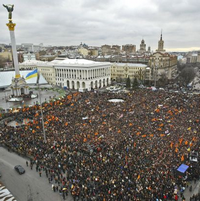With Ukraine set to vote in the second round of its presidential election on Sunday, both candidates -- Prime Minister Yulia Tymoshenko and former Prime Minister Viktor Yanukovych -- have promised closer ties with Russia. Most foreign coverage of the campaign has focused on popular disillusionment with the Orange Revolution in particular, and with democracy in general, as the explanation for this dramatic shift since the heady days of 2004. Indeed, a survey of attitudes toward democracy in post-Soviet countries published by the Pew Research Center in November 2009 was sobering: The popularity of democracy had fallen in Ukraine by 42 percent between 1991 and 2009 -- the sharpest decline in all the post-Soviet countries where surveys had been carried out. The 30 percent of Ukrainians who still supported democracy in 2009 was the lowest figure of the countries in the study.
One factor contributing to Ukrainians' growing discontent with democracy has rarely been acknowledged, in either Ukraine or the West: the semi-presidential political system in place in Kyiv since the Orange Revolution. At the height of that uprising, a quickly reached political compromise between pro- and anti-Orange groupings led to a hasty constitutional reform enacted on Dec. 8, 2004. When it came into force on Jan. 1, 2006, it formalized a division of executive power between the president and the prime minister that had only been nominal under former President Leonid Kuchma.
As a result of the changes, the power of both parliament and the prime minister were increased vis-à-vis the president. For instance, Ukraine's original 1996 constitution gave MPs only the right to give their consent to the prime minister, as proposed by the president. The amended constitution of 2004 states that the president shall put forward the candidate for the post of the prime minister following a proposal by parliament's majority or dominating coalition. Another change concerned the naming of ministers, who are now appointed and can be dismissed by Ukraine's Verkhovna Rada, the one-chamber national parliament. And in the event the president tries to block the adoption of a new law, the amended constitution allows the chairperson of the Verkhovna Rada to sign and promulgate the law instead.

